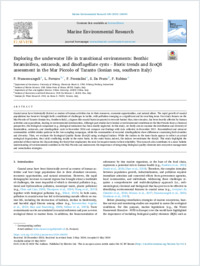Exploring the underwater life in transitional environments: Benthic foraminifera, ostracods, and dinoflagellate cysts – Biotic trends and EcoQS assessment in the Mar Piccolo of Taranto (Ionian sea, southern Italy)
DOKPE
- Francescangeli, F. ORCID University of Fribourg
- Ferraro, L. ORCID CNR Calata Porta di Massa, Naples, Italy
- Frontalini, F. ORCID Urbino University, Italy
- Da Prato, S. Institute of Geosciences and Earth Resources, CNR, Pisa, Italy
- Rubino, F. ORCID Institute for Water Research, CNR, Taranto, Italy
- 2024
Published in:
- Marine Environmental Research. - US : Elsevier BV. - 2024, vol. 198, p. 1-12
English
Coastal areas have historically thrived as centers of human activities due to their resources, economic opportunities, and natural allure. The rapid growth of coastal populations has however brought forth a multitude of challenges to tackle, with pollution emerging as a significant and far-reaching issue. Our study focuses on the Mar Piccolo of Taranto (Ionian Sea, Southern Italy), a lagoon-like coastal basin (separated in two sub-basins) that, since decades, has been heavily affected by human activities and aquaculture, leading to environmental deterioration. Although past studies have looked at environmental conditions in the Mar Piccolo from a chemical perspective, the biological component (e.g., biological indicators) has been mostly neglected. In this study, we firstly aim to examine the distribution and diversity of foraminifera, ostracods, and dinoflagellate cysts in December 2016 and compare our findings with data collected in December 2011. Foraminiferal and ostracod communities exhibit similar patterns in the two sampling campaigns, while the communities of encysted dinoflagellates show differences concerning both densities and diversity. Then, we evaluate the Ecological Quality Status (EcoQS) using ecological indices. While the indices in the inner basin appear to reflect an actual ecological degradation, they yield conflicting results in the outer basin. In the outer basin, indeed, the indices overestimate the EcoQS. This study highlights the potential of these indices for characterizing the EcoQS but emphasizes the need for improvements in their reliability. This research also contributes to a more holistic understanding of environmental condition in the Mar Piccolo and underscores the importance of integrating biological quality elements into ecosystem management and remediation strategies.
- Faculty
- Faculté des sciences et de médecine
- Department
- Département de Géosciences
- Language
-
- English
- Classification
- Geology
- License
- Open access status
- hybrid
- Identifiers
-
- DOI 10.1016/j.marenvres.2024.106545
- ISSN 0141-1136
- ISSN 1879-0291
- Persistent URL
- https://folia.unifr.ch/unifr/documents/328936
Other files
Statistics
Document views: 80
File downloads:
- francescangelietal.2024: 116
- tables1: 39

